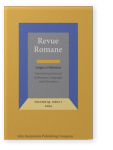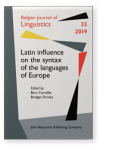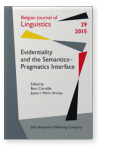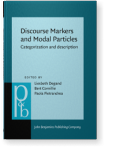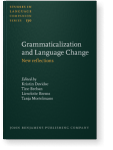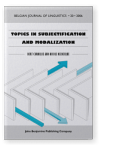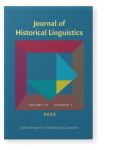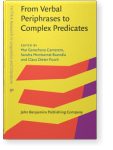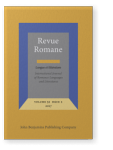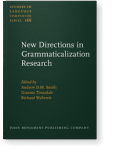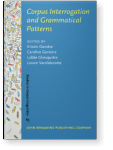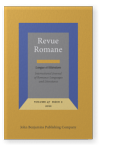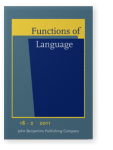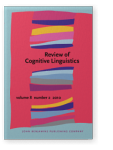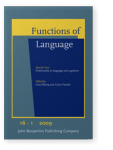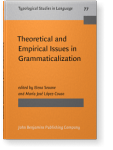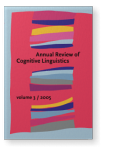Bert Cornillie
List of John Benjamins publications for which Bert Cornillie plays a role.
Journal
Latin influence on the syntax of the languages of Europe
Edited by Bert Cornillie and Bridget Drinka
[Belgian Journal of Linguistics, 33] 2019. v, 250 pp.
Subjects Theoretical linguistics
Hearer-Orientation in Spoken Genres
Edited by Bert Cornillie and Barbara De Cock
Special issue of Spanish in Context 12:1 (2015) vi, 176 pp.
Subjects Discourse studies | Pragmatics | Romance linguistics
Evidentiality and the Semantics-Pragmatics Interface
Edited by Bert Cornillie and Juana I. Marín-Arrese
[Belgian Journal of Linguistics, 29] 2015. v, 216 pp.
Subjects Theoretical linguistics
Discourse Markers and Modal Particles: Categorization and description
Edited by Liesbeth Degand, Bert Cornillie and Paola Pietrandrea
[Pragmatics & Beyond New Series, 234] 2013. v, 239 pp.
Subjects Discourse studies | Pragmatics | Syntax
Grammaticalization and Language Change: New reflections
Edited by Kristin Davidse, Tine Breban, Lieselotte Brems and Tanja Mortelmans
[Studies in Language Companion Series, 130] 2012. viii, 342 pp.
Subjects Functional linguistics | Historical linguistics | Theoretical linguistics
Topics in Subjectification and Modalization
Edited by Bert Cornillie and Nicole Delbecque
[Belgian Journal of Linguistics, 20] 2006. 208 pp.
Subjects Theoretical linguistics
2022 Asyndetic complementation and referential integration in Spanish: A diachronic probabilistic grammar account Journal of Historical Linguistics 12:2, pp. 194–240 | Article
This paper examines a distinctive syntactic feature of (pre)classical Spanish: asyndetic complementation (without complementizer que ‘that’). While many authors regard this construction as a stylistic variant which eventually declined (i.a., Girón 2005), so far no exhaustive morphosyntactic… read more
2022 The rise of the evidential readings of the Catalan periphrasis deure + infinitive From Verbal Periphrases to Complex Predicates, Garachana Camarero, Mar, Sandra Montserrat Buendia and Claus Dieter Pusch (eds.), pp. 63–85 | Chapter
In Romance, epistemic readings of modal verbs have traditionally been dealt with in terms of probability or epistemic commitment of the speaker (Spanish deber, French devoir, Italian dovere). Over the last years, new contributions have suggested the shared epistemic and evidential nature of… read more
2019 On the pace of syntactic elaboration from Latin calques: Evidence from Spanish, Dutch and English Latin influence on the syntax of the languages of Europe, Cornillie, Bert and Bridget Drinka (eds.), pp. 82–107 | Article
This paper addresses the auxiliation/grammaticalization of amenazar (Spanish), dreigen (Dutch), threaten (English), against the background of the competition between the vernacular languages and Latin. It shows that the subjective reading of ‘threaten’, expressing a prediction on the basis of… read more
2019 Latin influence on the syntax of the languages of Europe: Foundations and new perspectives Latin influence on the syntax of the languages of Europe, Cornillie, Bert and Bridget Drinka (eds.), pp. 1–10 | Article
This special issue explores the role of Latin in shaping the syntactic patterns of the European languages. Among the key issues examined are the identification of sources of syntactic change, whether internal or external, the chronologization of these changes, and their actualization. Authors… read more
2017 La duplicación de clíticos en español como estrategia de marcación inversa Revue Romane 52:2, pp. 190–206 | Article
Clitic doubling is the phenomenon in which, in a clause, a NP or a stressed pronoun and a clitic pronoun refer to the same entity and have the same syntactic function. Previous studies on this phenomenon in Spanish observe that it takes place when the elements involved have features such as… read more
2015 Más allá de la epistemicidad: Las funciones discursivas de los adverbios epistémicos y evidenciales en el español conversacional Hearer-Orientation in Spoken Genres, Cornillie, Bert and Barbara De Cock (eds.), pp. 120–139 | Article
El presente artículo trata sobre las funciones discursivas de los adverbios epistémicos y evidenciales en el español conversacional. En él se muestra que estos adverbios no solo varían en modo y en frecuencia relativa, sino que también juegan distintos papeles en la organización del proceso de… read more
2015 Ways of encoding attention to the interlocutor in contemporary spoken Spanish Hearer-Orientation in Spoken Genres, Cornillie, Bert and Barbara De Cock (eds.), pp. 1–9 | Article
The papers in this volume examine how Spanish speakers express attention to their interlocutors (or co-participants) verbally. It is now generally accepted that subjective expressions have interactional functions, encouraging the flow of discussion and creating cohesive discourse and that there are… read more
2015 The diachrony of subjective amenazar ‘threaten’: On Latin-induced grammaticalization in Spanish New Directions in Grammaticalization Research, Smith, Andrew D.M., Graeme Trousdale and Richard Waltereit (eds.), pp. 187–208 | Article
In the functional-linguistic literature, amenazar and other ‘threaten’ verbs have been accounted for in terms of grammaticalization and subjectification of the lexical construction/reading of amenazar + infinitive into a subjective construction/reading of amenazar + infinitive. On the basis of… read more
2015 Evidentiality and the semantics-pragmatics interface: An introduction Evidentiality and the Semantics-Pragmatics Interface, Cornillie, Bert and Juana I. Marín-Arrese (eds.), pp. 1–18 | Article
2014 The speech functions of tag questions
and their properties. A comparison of their distribution in COLT and LLC Corpus Interrogation and Grammatical Patterns, Davidse, Kristin, Caroline Gentens, Lobke Ghesquière and Lieven Vandelanotte (eds.), pp. 321–350 | Article
This article proposes a classification of speech functions of variable tag questions in British English conversations. Based on intonational, conversational and formal criteria the analysis shows that tag questions can not only function as questions and statements, but also as responses, commands… read more
2013 Introduction Discourse Markers and Modal Particles: Categorization and description, Degand, Liesbeth, Bert Cornillie and Paola Pietrandrea (eds.), pp. 1–18 | Introduction
2012 Un análisis cognitivo-funcional de la concordancia verbal con construcciones (pseudo)partitivas del tipo [N1 + de + N2] Revue Romane 47:2, pp. 219–257 | Article
In this paper we present a corpus-based, cognitive-linguistic account of the singular/plural agreement alternation with binominal constructions belonging to the [N1singular + de + N2plural]-type. From a syntagmatic point of view, plural agreement reflects a shift from N1 as the head of the Noun… read more
2010 On conceptual semantics and discourse functions: The case of Spanish modal adverbs in informal conversation Review of Cognitive Linguistics 8:2, pp. 300–320 | Article
This paper deals with the conceptual semantics and the discourse functions of Spanish epistemic adverbs and/or adverbial phrases such as quizá, tal vez, a lo mejor, igual, lo mismo ‘maybe/perhaps’ in informal conversation. The study is based upon the following hypothesis: the best basis for a… read more
2009 Evidentiality and epistemic modality: On the close relationship between two different categories Evidentiality in language and cognition, Ekberg, Lena and Carita Paradis (eds.), pp. 44–62 | Article
This paper attempts to explain the terminological and conceptual confusion of evidentiality and epistemic modality. It presents a functionally oriented semantic analysis which does not belong to a specific theoretical framework. It shows that the alleged epistemic speaker commitment of evidential… read more
2008 On the grammaticalization and (inter)subjectivity of evidential (semi-)auxiliaries in Spanish Theoretical and Empirical Issues in Grammaticalization, Seoane, Elena and María José López-Couso (eds.), pp. 55–76 | Article
2008 Speaker commitment: Back to the speaker. Evidence from Spanish alternations Commitment, De Brabanter, Philippe and Patrick Dendale (eds.), pp. 37–62 | Article
This paper proposes an alternative cognitive account of the notion of speaker commitment in terms of speaker involvement and processing. The focus will be on the role of the speaker as conceptualizer. Invoking conceptualizer-related processing instead of speaker commitment has the advantage of… read more
2006 Introduction Topics in Subjectification and Modalization, Cornillie, Bert and Nicole Delbecque (eds.), pp. vii–xii | Miscellaneous
2005 On modal grounding, reference points, and subjectification: The case of the Spanish epistemic modals Annual Review of Cognitive Linguistics: Volume 3, Ruiz de Mendoza Ibáñez, Francisco José (ed.), pp. 56–77 | Article
In this paper it is argued that Langacker’s definition of grounding predications is problematic for languages other than English. The idea that in English tense and modal auxiliaries are mutually exclusive grounding elements leads Langacker (1990, 2003) to consider both deontic and epistemic modal… read more
2004 The shift from lexical to subjective readings of Spanish prometer ‘to promise’ and amenazar ‘to threaten’. a corpus-based account Pragmatics 14:1, pp. 1–30 | Article
The Spanish verbs amenazar ‘to threaten’ andprometer ‘to promise’ do not only have a lexical reading but can also yield a subjective one, whereby the likelihood of the event expressed in the infinitive receives a negative, resp. a positive, evaluation. Three hypotheses are being tested: 1) as an… read more
